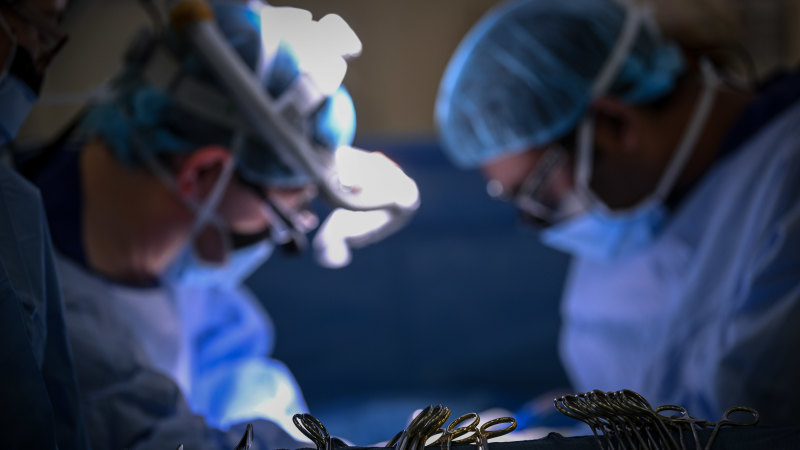Save articles for later
Add articles to your saved list and come back to them any time.
Gender-affirming procedures such as chest surgery and genital reconfiguration would be subsidised by Medicare under a push to improve mental health and quality of life for transgender people.
The federal health department will consider an application from the Australian Society of Plastic Surgeons that seeks to establish 21 Medicare items for gender-affirming surgeries for people who have gender incongruence, in which a person’s experience of gender does not align with how they were born.
The application said gender-affirming surgery is already being performed in Australia but the system is fragmented and can have high out-of-pocket costs.Credit: Eddie Jim
The application to the Medical Services Advisory Committee says gender-affirming surgery – a catch-all term for procedures that align a person’s body with their gender identity – is already being performed in Australia but that the system is fragmented and can have high out-of-pocket costs.
It estimated there would be 64,101 transgender people who were born male and 64,044 transgender people who were born female who could be candidates for the procedures in Australia.
The procedures pitched for Medicare coverage include feminising chest surgery, which may involve inserting prosthetics or fat grafts, and masculinising chest surgery, which may or may not require repositioning nipples.
There are also proposed Medicare items for genital reconfiguration surgery, which could involve removing genitals or constructing a neo-penis or neo-vagina, as well as feminising or masculinising facial surgery and voice surgery.
The proposal, which will be considered at a meeting next month, suggests the Medicare rebates be limited to adults between 18 and 50 years old.
“Some medical interventions for gender affirmation are irreversible, may be associated with a risk of adverse effects, involve complex surgical procedures or have consequences on reproductive options after treatment,” it says.
People seeking gender-affirming surgeries currently deal with a mix of non-specific Medicare items or fund their treatment themselves, and they might pay more than $20,000 or go overseas to access surgery.
“The current funding arrangements for surgical procedures is highly fragmented,” the application says.
It says current Medicare item descriptors are a “poor fit” for gender-affirming surgeries that cause anxiety to doctors who used them, in case they are not appropriate, while other interventions are not subsidised when used for gender-affirming purposes.
“Despite the lack of [Medicare] funding, these procedures are well-established for the purposes of gender affirmation,” it says.
The fee list, to be based on existing rebates for similar procedures, is still being developed. The application gives examples suggesting a $1335.70 rebate for masculinising chest surgery, and that voice surgery can be covered by a $621.20 or $1006.55 rebate, depending on the type of procedure.
But the overall cost per patient would vary substantially depending on which procedures are performed.
The Australian Society of Plastic Surgeons declined a request for an interview. However, its application says legitimised and universal access to gender-affirming medical interventions is an important way of improving the mental health of transgender people and those with gender incongruence.
Australian studies have shown such people report higher rates of psychiatric conditions, suicidal ideation and suicide attempts than the general population. Other research shows gender diverse people report their quality of life significantly improved after undergoing gender-affirming surgery.
A 2021 petition for public funding of gender-affirming surgery was backed by almost 150,000 people, but then-health minister Greg Hunt in his response said no specific application had been made to list items through the Medicare Benefits Schedule.
The Australian Society of Plastic Surgeons wrote that its new application “directly addresses the gap identified by then Minister Hunt as a means to progress making gender-affirming services eligible for a Medicare benefit”.
Royal Australian College of GPs vice president Bruce Willett said the Medicare advisory committee had a vital role in weighing up evidence to carefully consider the application. “Patients should be able to access the care and treatments they need, regardless of income or postcode,” he said.
“There is next to no access to gender-affirming surgeries within the public system. Evidence suggests surgery can relieve gender dysphoria, improve patient mental health and quality of life, and potentially save lives. No one should be left behind, and that is exactly what can happen when people come up against long waiting lists for care.”
A Health Department spokesperson said the application would be considered by a sub-committee in December, before a likely assessment by the full advisory committee next year.
”The Australian government is committed to supporting Australians to access high-quality health care,” the spokesperson said. “There is a range of [Medicare] items that could be used at various stages of the gender-affirming process, including GP and specialist consultation items. [Medicare] rebates are also available for some surgical procedures which may be performed during gender affirmation process.“
Most Viewed in Politics
From our partners
Source: Read Full Article


